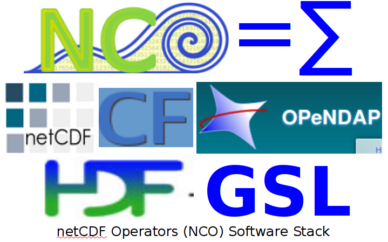NCO

The NCO toolkit manipulates and analyzes data stored in netCDF-accessible formats, including DAP, HDF4, and HDF5.
The netCDF Operators (NCO) comprise about a dozen standalone, command-line programs that take netCDF, HDF, and/or DAP files as input, then operate (e.g., derive new fields, compute statistics, print, hyperslab, manipulate metadata, regrid) and output the results to screen or files in text, binary, or netCDF formats. NCO aids analysis of gridded and unstructured scientific data. The shell-command style of NCO allows users to manipulate and analyze files interactively, or with expressive scripts that avoid some overhead of higher-level programming environments.
- ncap2 netCDF Arithmetic Processor (examples)
- ncatted netCDF ATTribute EDitor (examples)
- ncbo netCDF Binary Operator (addition, multiplication…) (examples)
- ncclimo netCDF CLIMatOlogy Generator (examples)
- nces netCDF Ensemble Statistics (examples)
- ncecat netCDF Ensemble conCATenator (examples)
- ncflint netCDF FiLe INTerpolator (examples)
- ncks netCDF Kitchen Sink (examples)
- ncpdq netCDF Permute Dimensions Quickly, Pack Data Quietly (examples)
- ncra netCDF Record Averager (examples)
- ncrcat netCDF Record conCATenator (examples)
- ncremap netCDF REMAPer (examples)
- ncrename netCDF RENAMEer (examples)
- ncwa netCDF Weighted Averager (examples)
NCO Documentation
The netCDF Operators (NCO) are freely available in source form and as pre-built binaries (much easier) on all operating systems, and the binaries are pre-installed on all major E3SM machines.
The primary documentation source is the NCO homepage, which contains instructions to download, build, and install, and pointers to the manual, FAQ, and examples. The recapitulation below includes some information specifically developed for E3SM users, and is not available on the homepage.
- Prerequisites: http://nco.sf.net#build
- How to Install: http://nco.sf.net#install, Supported Software, Machines and POCs
- Quick Start:
- Examples for E3SM climatologies and regridding: Generate, Regrid, and Split Climatologies (climo files) with ncclimo and ncremap
- Operator-specific examples: http://nco.sf.net/nco.html#xmp_ncra (prepend any operator name with “xmp_”)
- Users Guide: HTML, PDF
- Code Repository: http://github.com/nco/nco
- Code Citation: DOI: 10.5281/zenodo.595745
- License: GPL3
- User support: http://nco.sf.net#help, zender@uci.edu (personal e-mail only for E3SM-related questions)
- Bug reports: https://sourceforge.net/p/nco/bugs, https://github.com/nco/nco/issues
- How to contribute to the code development: http://nco.sf.net#contribute
Requested Acknowledgement:
Zender, C. S. (2008), Analysis of Self-describing Gridded Geoscience Data with netCDF Operators (NCO), Environ. Modell. Softw., 23(10), 1338-1342, doi:10.1016/j.envsoft.2008.03.004.


